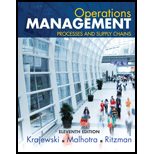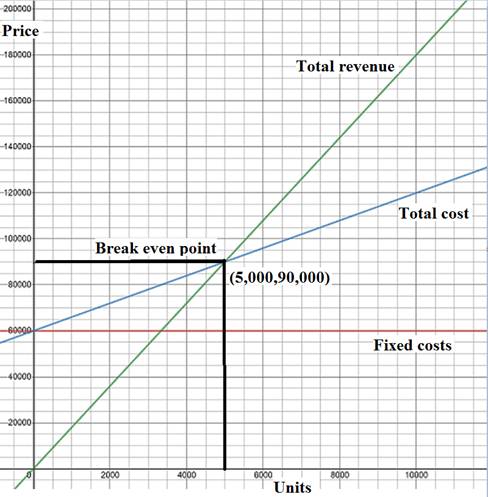
Mary Williams, owner of Williams Products, is evaluating whether to introduce a new product line. After thinking through the production process and the costs of raw materials and new equipment, Williams estimates the variable costs of each unit produced and sold at $6 and the fixed costs per year at $60,000.
- If the selling price is set at $18 each, how many unit must be produced and sold for Williams to break even? Use both graphic and algebraic approaches to get your answer.
- Williams
forecasts sales of 10,000 units for the first year if the selling price is set at $14 each. What would be the total contribution to profits from this new product during the first year? - If the selling price is set at $12.50, Williams forecasts that first-year sales would increase to 15,000 units. Which pricing strategy ($14.00 or $12.50) would result in the greater total contribution to profits?
- What oilier considerations would be crucial to the final decision about making and marketing the new product?
a.
To calculate: The break even quantity using both graphic and algebraic approaches.
Concept Introduction: Break-even point is explained as a point where a company is earning no profits and incurring no losses reflecting that total cost is equivalent to total income.
Explanation of Solution
Given information:
Variable costs: $6 per unit
Fixed costs: $60,000
Selling price: $18 per unit
Break-even quantity: ?
Calculation of break even quantity:
Hence, the break even quantity is 5,000 units.
Graphic approach for calculating break even quantity:

Fig (1)
b.
To calculate: The total contribution to profits from this new product.
Concept Introduction: Profit is explained as surplus of total income over total costs.
Explanation of Solution
Given information:
Forecasted sales: 10,000 units
Selling price: $14 per unit
Calculation of total contribution to the profits:
Therefore, the total contribution from the new product is $20,000.
c.
To calculate: The total contribution to profits from this new product if selling price is $12.50.
Concept Introduction: Profit is explained as surplus of total income over total costs.
Explanation of Solution
Given information:
Forecasted sales: 15,000 units
Selling price: $12.50 per unit
Calculation of total contribution to the profits:
Therefore, the total contribution from the new product is $37,500.
If selling price is $14 and forecasted sales are 15,000 units, then,
Calculation of total contribution to the profits:
It can be concluded that when selling price is $14 then it can get a greater total contribution to Company W.
d.
To identify: The other considerations that would be crucial for final decision making for the new product.
Concept Introduction: Decision making is a process in which members of an organization select a particular course of action in response to both problem and opportunity. The objective of decision making is to gain a maximum and profitable result.
Explanation of Solution
Other considerations that would be crucial for final decision making of new product are:
- Company W can identify and evidently state the problems.
- Various other alternatives should be evaluated and for the same information should be collected.
Decisions are taken by organizations on the basis these procedures that are generally performed: break even analysis, decision tree, preference matrix and preference decision tree.
Want to see more full solutions like this?
Chapter A Solutions
Operations Management: Processes and Supply Chains (11th Edition)
Additional Business Textbook Solutions
Gitman: Principl Manageri Finance_15 (15th Edition) (What's New in Finance)
Microeconomics
Principles of Operations Management: Sustainability and Supply Chain Management (10th Edition)
Marketing: An Introduction (13th Edition)
Intermediate Accounting (2nd Edition)
Horngren's Cost Accounting: A Managerial Emphasis (16th Edition)
- Identify specific performance management processes covered in this course and how each aligns with an elements of LaFevor’s HCMS Model.arrow_forwardIdentify specific performance management processes covered in this course and how each aligns with LaFevor’s HCMS Model. LaFevor, K. (2017). What’s in Your Human Capital Management Strategy? The Game Plan, the Path, and Achievingarrow_forwardassess how Human Capital Management Strategy is aimed at building an effective integrated performance management system: Discuss how human capital management strategy relates to performance management.arrow_forward
- CASE STUDY 9-1 Was Robert Eaton a Good Performance Management Leader? R obert Eaton was CEO and chairman of Chrys- ler from 1993 to 1998, replacing Lee Iacocca, who retired after serving in this capacity since 1978. Eaton then served as cochairman of the newly merged DaimlerChrysler organization from 1998 to 2000. In fact, Eaton was responsible for the sale of Chrysler Corporation to Daimler-Benz, thereby creating DaimlerChrysler. With 362,100 employees, DaimlerChrysler had achieved revenues of €136.4 billion in 2003. DaimlerChrysler's passenger car brands included Maybach, Mercedes-Benz, Chrysler, Jeep, Dodge, and Smart. Commercial vehicle brands included Mercedes-Benz, Freightliner, Sterling, Western Star, and Setra. From the beginning of his tenure as CEO, Eaton communicated with the people under him. He immediately shared his plans for the future with his top four executives, and upon the advice of his colleague, Bob Lutz, decided to look around the company before making any hasty…arrow_forwardCritically assess Martin’s coaching style.arrow_forwardCompare Robert Eaton’s performance management leadership presented in the case against the performance management leadership principles, functions, and behaviors. What recommendations can be made about what he might do more effectively? Explain and defend your answer.arrow_forward
- In the context of the material in Chapter 9, provide a critical analysis of the decisions that Henry has made in assigning Martin to this role.arrow_forwardpanies (pp. 80-118). New York, NY: Times Books, specifically Chap. 4, "Robert Eaton and Robert Lutz; The Copilots." CASE STUDY 9-2 Performance Management Leadership at Henry's Commercial Sales and Leasing H enry is the owner of a small real estate agency that handles the sale and leasing of commercial property. He has two real estate agents working in the office, along with himself. He also has two customer service representatives (CSRs), each of whom has a real estate license, and one receptionist who has worked for the company for about three months. Henry has recently decided that he needs another customer service representative. He hasarrow_forwardDiscuss possible solutions to help Tara become an effective CSR. What should martin be doing to help her?arrow_forward
- What are the ethical challenges regarding employees (i.e., diversity, discrimination, sexual harassment, privacy, employee theft, bad leadership, etc.) that Apple Inc. has faced over the past five to ten years and that they should prepare to face in the next five to ten years. Once a developed list of challenges is created, consider how having faced those challenges will impact and be impacted by the social cause you've selected. Propose the findings on the ethical challenges faced by Apple Inc. in recent history and the near future. Analyze ways in which each challenge was (and/or could be) appropriately handled and areas for improvement. Evaluate the ethical/moral aspects of Apple Inc. that protected it from ethical challenges in the past and could protect it in the future. Assess how ethical challenges and handling of ethical challenges could positively or negatively impact the charitable cause are selected and how the selection of your social cause could positively or negatively…arrow_forwardBy selecting Cigna Accredo pharmacy that i identify in my resand compare the current feedback system against the “Characteristics of a Good Multiple Source Feedback Systems” described in section 8-3-3. What can be improved? As a consultant, what recommendations would you make?arrow_forwardScenario You have been given a task to create a demand forecast for the second year of sales of a premium outdoor grill. Accurate forecasts are important for many reasons, including for the company to ensure they have the materials they need to create the products required in a certain period of time. Your objective is to minimize the forecast error, which will be measured using the Mean Absolute Percentage Error (MAPE) with a goal of being below 25%. You have historical monthly sales data for the past year and access to software that provides forecasts based on five different forecasting techniques (Naïve, 3-Month Moving Average, Exponential Smoothing for .2, Exponential Smooth for .5, and Seasonal) to help determine the best forecast for that particular month. Based on the given data, you will identify trends and patterns to create a more accurate forecast. Approach Consider the previous month's forecast to identify which technique is most effective. Use that to forecast the next…arrow_forward
- MarketingMarketingISBN:9780357033791Author:Pride, William MPublisher:South Western Educational Publishing
 Purchasing and Supply Chain ManagementOperations ManagementISBN:9781285869681Author:Robert M. Monczka, Robert B. Handfield, Larry C. Giunipero, James L. PattersonPublisher:Cengage Learning
Purchasing and Supply Chain ManagementOperations ManagementISBN:9781285869681Author:Robert M. Monczka, Robert B. Handfield, Larry C. Giunipero, James L. PattersonPublisher:Cengage Learning  Contemporary MarketingMarketingISBN:9780357033777Author:Louis E. Boone, David L. KurtzPublisher:Cengage Learning
Contemporary MarketingMarketingISBN:9780357033777Author:Louis E. Boone, David L. KurtzPublisher:Cengage Learning




